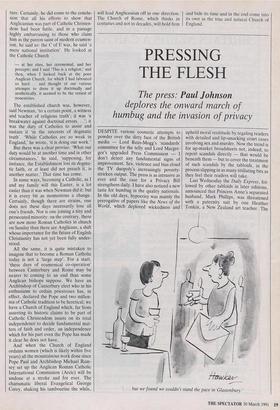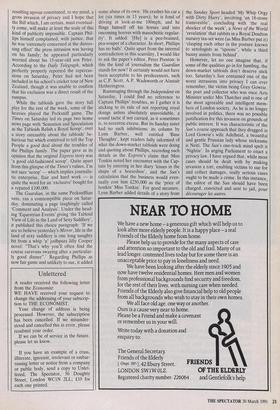PRESSING THE FLESH
The press: Paul Johnson
deplores the onward march of humbug and the invasion of privacy
DESPITE various cosmetic attempts to powder over the dirty face of the British media — Lord Rees-Mogg's 'standards' committee for the telly and Lord Macgre- gor's upgraded Press Commission — I don't detect any fundamental signs of improvement. Sex, violence and bias cloud the TV duopoly's increasingly poverty- stricken output. The press is as intrusive as ever and the case for a Privacy Bill strengthens daily. I have also noticed a new taste for humbug in the quality nationals. In the old days, hypocrisy was mainly the prerogative of papers like the News of the World, which deplored wickedness and
upheld moral recititude by regaling readers with detailed and lip-smacking court cases involving sex and murder. Now the trend is for up-market broadsheets not, indeed, to report scandals directly — that would be beneath them — but to cover the treatment of such scandals by the tabloids, in the process slipping in as many titillating bits as they feel their readers will take.
Last Wednesday the Daily Express, fol- lowed by other tabloids in later editions, announced that Princess Anne's separated husband, Mark Phillips, was threatened with a paternity suit by one Heather Tonkin, a New Zealand art teacher. The . . but we found we couldn't stand the pace in Glastonbury.' resulting uproar constituted, to my mind, a gross invasion of privacy and I hope that the Bill which, I am certain, must eventual- ly come, will make at least the scale of this kind of publicity impossible. Captain Phil- lips himself complained, with justice, that he was 'extremely concerned at the distres- sing effect' the press intrusion was having on his family; he appeared particularly worried about his 15-year-old son Peter. According to the Daily Telegraph, which perfectly properly reported the repercus- sions on Saturday, Peter had not been included in his school's cricket tour of New Zealand, though it was unable to confirm that his exclusion was a direct result of the rumpus.
While the tabloids gave the story full play for the rest of the week, some of the heavies played the Pecksniff game. The Times on Saturday led its page two home news page with 'Sensation and Speculation as the Tabloids Relish a Royal Scoop', over a story ostensibly about the tabloids' be- haviour but which contrived to tell the Top People a good deal about the troubles of the Phillips family. The paper gave as its opinion that the original Express story was `a good old-fashioned scoop'. Quite apart from this glimpse of the Times's values, I'm not sure 'scoop' — which implies journalis- tic enterprise, flair and hard work — is quite the word for an 'exclusive' bought for a reputed £100,000. The Guardian, in the same Pecksniffian vein, ran a comtemptible piece on Satur- day, dominating a page laughingly called `Comment and Analysis'. Under the head- ing 'Equestrian Events' giving 'the Tabloid View of Life in the Land of Sexy Saddlery', it published this choice paragraph: 'If we are to believe yesterday's Mirror, life in the land of sexy saddlery is one long naughty bit from a whip 'n' jodhpurs filly Cooper novel: "That's why you'll often find the course caravans swaying after a particular- ly good dinner".' Regarding Phillips as now fair game and unlikely to sue, it added some abuse of its own: 'He crashes his car a lot (six times in 13 years); he is fond of driving at look-at-me 100mph; and he flings himself off his horses and into oncoming hooves with masochistic regular- ity'. It added: '[He] is a pea-brained, pea-souper of a character. In short, Phillips has no balls'. Quite apart from the internal contradiction in this scurrility, I would like to ask the paper's editor, Peter Preston: is this the kind of journalism the Guardian stands for now? It certainly would not have been acceptable to his predecessors, such as C.P. Scott, A.P. Wadsworth or Alastair Hetherington.
Rummaging through the Independent on Saturday, I could find no reference to Captain Phillips' troubles, so I gather it is sticking to its rule of not reporting royal doings unless absolutely unavoidable, a sound tactic if not carried, as it sometimes is, to eccentric excess. But its Sunday sister had no such inhibitions: its column by Lynn Barber, well entitled 'Base Thoughts', kept readers fully informed of what the down-market tabloids were doing and quoting about Phillips, recording such details as the Express's claim that Miss Tonkin noted her encounter with the Cap- tain by entering in her diary 'kisses in the shape of a horseshoe', and the Sun's calculation that the business would even- tually cost him £250,000 as the 'price of bonkin' Miss Tonkin'. For good measure, Lynn Barber added details of a story from the Sunday Sport headed 'My Whip Orgy with Dirty Harry', involving 'an 18-stone transvestite', concluding with 'the real shocker of the week', a News of the World `revelation' that rabbits in a Royal Doulton nursery tea-set were (as Miss Barber put it) `clasping each other in the posture known to sexologists as "spoons", while a third bunny assists from behind'.
However, let no one imagine that, if some of the qualities go in for humbug, the down-market tabloids don't deserve stick too. Saturday's Sun contained one of the worst intrusions into privacy I can ever remember, the victim being Grey Gowrie, the poet and collector who was once Arts Minister under Mrs Thatcher and is one of the most agreeable and intelligent mem- bers of London society. As he is no longer involved in politics, there was no possible justification for this invasion on grounds of public interest. It was characteristic of the Sun's coarse approach that they dragged in Lord Gowrie's wife Adelheid, a beautiful and gentle Prussian lady whose nickname is Neiti. The Sun's one-track mind spelt it `Nightie'. In urging Parliament to enact a privacy law, I have argued that, while most cases should be dealt with by making invasion a tort, enabling victims to sue for and collect damages, really serious cases ought to be made a crime. In this instance, the editor of the Sun should have been charged, convicted and sent to jail, pour decourager les autres.



















































 Previous page
Previous page